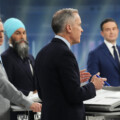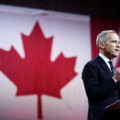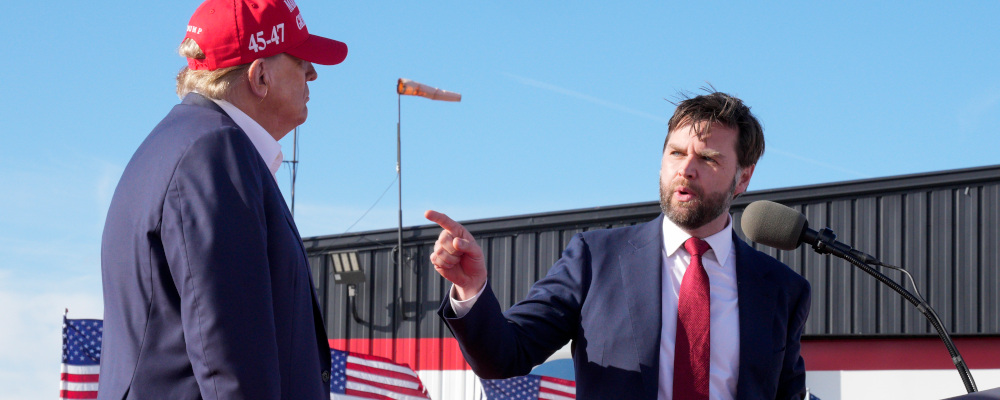I was born at the end of history. No, really.
My mother gave birth to me on October 20, 1989. The Berlin Wall fell 20 days later, and the Ceaușescus were executed 46 days after that. So sped up the falling apart of the Soviet Union and the winding down of the decades-long Cold War that defined our parents’ youth. By the time my peers and I were in school, post-Cold War optimism was reaching a fever pitch.
It seems moronically naïve now to suggest that the mere fact of increasing global wealth and democracy would stave off geopolitical strife, that since “no two countries that both have a McDonald’s have ever fought a war against each other” none ever would. And that therefore the job of liberal democracies like Canada and the United States was to push a kind of fast-food diplomacy. But at the time, it was gospel. The 1990s were a sweet spot for kids in most Western democracies. We weren’t hiding under desks during bomb threats, and smartphones hadn’t yet invaded our lives. The Bosnian genocide felt like a blip that mostly went over our heads and the optimism of the Oslo Accords only enhanced the hubris of increasingly mainstream peaceniks.

Then 9/11 happened. A flash of extraordinary evil to be sure, but who to blame? At first, it was enough to promise vengeance, but soon action had to be taken. Afghanistan seemed to make sense. Even though 9/11 was perpetrated by non-state actors, the country was harbouring al-Qaeda, and we needed to get Osama Bin Laden. Iraq was a harder circle to square—a difficult truth I learned as a gung-ho contrarian junior high student willing to take up the side in the class debate no one else would volunteer for and finding myself struggling to justify what was increasingly understood to be a poorly conceived invasion with increasingly high costs. I was 17 years old when the U.S.-Iraq war casualties peaked in 2007. As it happens, J.D. Vance was 23.
Of course, I bring up Vance for a reason. The context in which he, I, and our millennial generation grew up is crucial to understanding the concerning rise in varying degrees of isolationism among young, right-wing leaders in the U.S. (and to a lesser extent Canada). It’s tempting to not even try to understand. Far easier, and more gratifying, to call Ukraine war funding skeptics Putin stooges, useful idiots, and conspiracy theorists, chalking their cynicism up to too much Tucker Carlson.
But just because we disagree with them doesn’t mean we should dismiss them. Some of these skeptics come by their analysis honestly, informed by a very different upbringing than the neocon boomers who come to their foreign policy hawkishness so easily. Those of us who believe the U.S. and its allies must pursue peace through strength ought to be engaging with the arguments put forward by the young isolationists, particularly those who share some of our first principles. By continuing to talk past one another, we risk winding up on the wrong side of a demographic trend, shaking our fists at the sky as the neocons age out of the public discourse, and America one day soon really does turn inward.
The Ukraine funding skeptics are making relatively detailed public policy arguments, as Vance does here in the New York Times. They are ready and willing to be engaged with. And the more prominent among them tend to be ideas politicians, identifying problems caused by previous generations (often in their own party), and putting forward new policy programs to try to solve them. What’s striking is that their positions on everything from China to industrial policy to nationalism and strong borders seem to belie their position on Ukraine. Senator Marco Rubio, for instance, voted against the most recent foreign aid package. This despite having fled Cuba, building his career advocating for anti-communist foreign policy, leading his peers on China skepticism, and speaking out against dictatorships the world over.
Rubio and his Senate colleague Vance have also prioritized making an argument for a strong industrial policy. Often harkening back to the heyday of America’s manufacturing heartland, they advocate for re-shoring supply chains and investing in key industries to revitalize sectors that produce well-paying, stable jobs. Indeed, many of the policy thinkers of their intellectual movement point to “expanding defence industrial capacity” to prepare the U.S. to defend its interests and that of its allies abroad and strengthen the domestic economy. Vance argues in his New York Times essay that the U.S. doesn’t have the defence manufacturing capacity to make the number of artillery shells that Ukraine needs. But isn’t that just an argument for exactly the kind of industrial policy he and his supporters have been advocating for?

Finally, many of the national conservatives who oppose Ukraine funding, embrace an old-fashioned patriotism, cultural nationalism, and concern for border sovereignty that lends itself very well to an argument for supporting allies in their own battles for national sovereignty. Indeed, they point to the migrant crisis at America’s southern border, and the current administration’s inadequate response, as the main reason they wouldn’t support the aid bill.
But this very concern for the strength of one’s own national borders, for the virtues of one’s own domestic population, for the shared values of one’s own people, and for the vitality of one’s own economy is precisely why wealthy Western countries ought to arm our peer nations who are struggling to preserve exactly those things, especially when the forces that threaten them could very well threaten us next. It’s not a leap for the young isolationists to support more aid to Ukraine (or Israel, or eventually Taiwan), which is why we should try to help them make it.
Because of course, Fukuyama was wrong. At most, as Bari Weiss puts it, we had but a “holiday from history.” Now that the holiday’s over, it’s easier for those who grew up with Ronald Reagan’s assertive foreign policy clarity to revert to a posture that worked. But for many millennials, chest-thumping about Russia and Iran sounds like a precursor to a quagmire, their minds sending them back to the mess in Iraq, and the foreign aid package dollar figures making them fret about their own economic circumstances. They want to believe that the U.S. and its allies can disengage from the world, letting strong men rein and civilizations fall with no domestic consequences.
Our task is explaining the likely consequences of that approach, without disdain or dismissiveness. Yes, even if you think our interlocutors occasionally watch too much Tucker Carlson.
Recommended for You

‘Be careful what you wish for’: Andrew Coyne on what the federal election results mean for the future of Canadian politics

‘He’s gone from zero to hero in 90 days’: The Roundtable breaks down Carney’s win and the rest of the Canadian election results

Sean Speer: Mark Carney’s win will add more uncertainty

‘I think we are at a breaking point in this country’: Darrell Bricker on the national unity question moving from Quebec to Alberta




